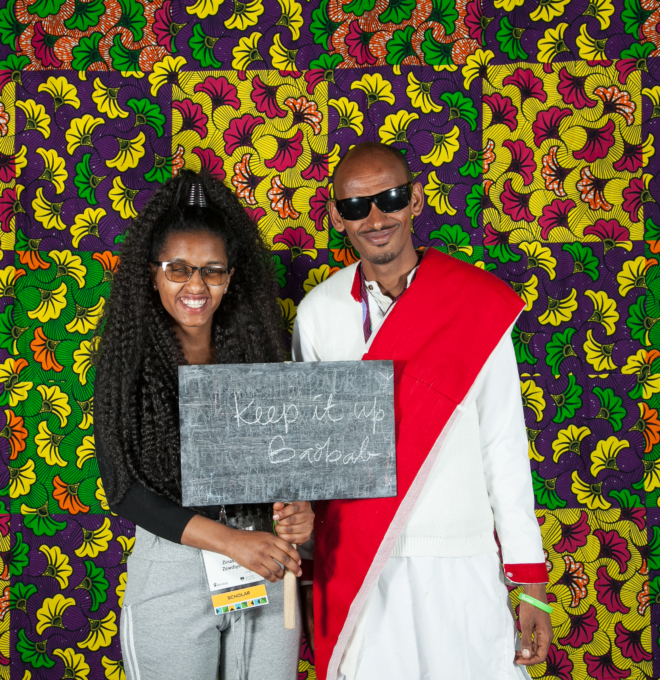
Zinash at the Baobab Scholars Convening August 2019 in Kigali, Rwanda.
An Accessible Future Starts Today
Zinash Zewidiye, is a second-year law student and Mastercard Foundation Scholar at the University of Gondar in Ethiopia. Today, on the International Day for Persons Living With Disabilities, she reminds us that to achieve a more accessible future we must first listen, and understand the barriers people living with disabilities face today.
Growing up as one of nine children, in Debre Tabor, Ethiopia, Zinash was raised with the same values–patience, positivity, and persistence– as her three sisters and five brothers. And like them, she was expected to complete both her homework and household chores. Full of energy, she enjoyed a diverse range of extracurricular activities including karate, drama, literature and student council. But Zinash has a low vision impairment, which means that despite being a bright, confident, courageous young woman, she confronts barriers that her siblings do not, particularly around education.
School options were limited in her rural village, 656 kilometers from Addis Ababa. “In my place of birth, schools were not accessible for me, and staff and communities treated me like a normal pupil. So, the situation was very terrible for me at the time.” Knowing it would be nearly impossible for her to receive the support she needed to succeed in Debre Tabor, her parents arranged for Zinash to live with her uncle in Addis Ababa and attend primary and secondary school there.
In Addis, Zinash excelled academically. But though she had more options to choose from, she still remembers the “shocking” response of school’s administrators when she tried to register for secondary schooling. Taking her case to a government official, Zinash was eventually allowed to enroll. “They did not know how to treat me or provide inclusive teaching-learning methods,” she recalls. However, once they saw her academic scores, the teachers and school administration tried their best to help her. Zinash noted that people would be kind when they took the time to understand her potential. This is why she believes that dialogue is key to building a more accessible future, most people just don’t know or understand the challenges she and others with disabilities face day to day.
“For those living with disabilities in Ethiopia, especially children it is very challenging. There is a lack of stationary, the teaching-learning methodology is not inclusive, getting assistants during exams is very challenging, and mobility in school and outside the school was a big challenge for me in primary and secondary school,” said Zinash. But these experiences have filled her with self-confidence and courage, and she encourages others to talk to their family, teachers, friends and community to help address the challenges they face. Always positive, she believes that any mistreatment she received was unintentional and simply due to a lack of awareness.
As a Mastercard Foundation Scholar at Gondar, Zinash continues to excel. In addition to her studies in law–she hopes to study further and become a human rights activist–she sits on the Mastercard Foundation Scholars Program Council as the student representative for Gondar. She is pleased with the steps the university has taken to be more accessible such as building a road from the dormitory to the library, providing tutorial classes and electronic devices to students in need, as well as hiring more assistants. However, she believes more can be done.
“Of course, the Scholars Program at Gondar is in its infancy, and the University of Gondar only started receiving students with disabilities in large numbers very recently. It requires integrating its work with government and other non-governmental organization to improve our accessibility challenges,” said Zinash.
In addition to building an audio library at the university, Zinash would like to see more students with disabilities win scholarships. “I would like to recommend the Mastercard Foundation Scholars Program widen its recruitment pool and create awareness so more students with disabilities will apply to become a Scholar,” said Zinash. She also reminds us that primary and secondary school students need access to more equitable and accessible learning environments. “To create and sustain a future that is accessible for persons with disabilities, different institutions, young people, and communities must work together cooperatively to define what an accessible future means and co-create solutions for the existing challenges we face.”


